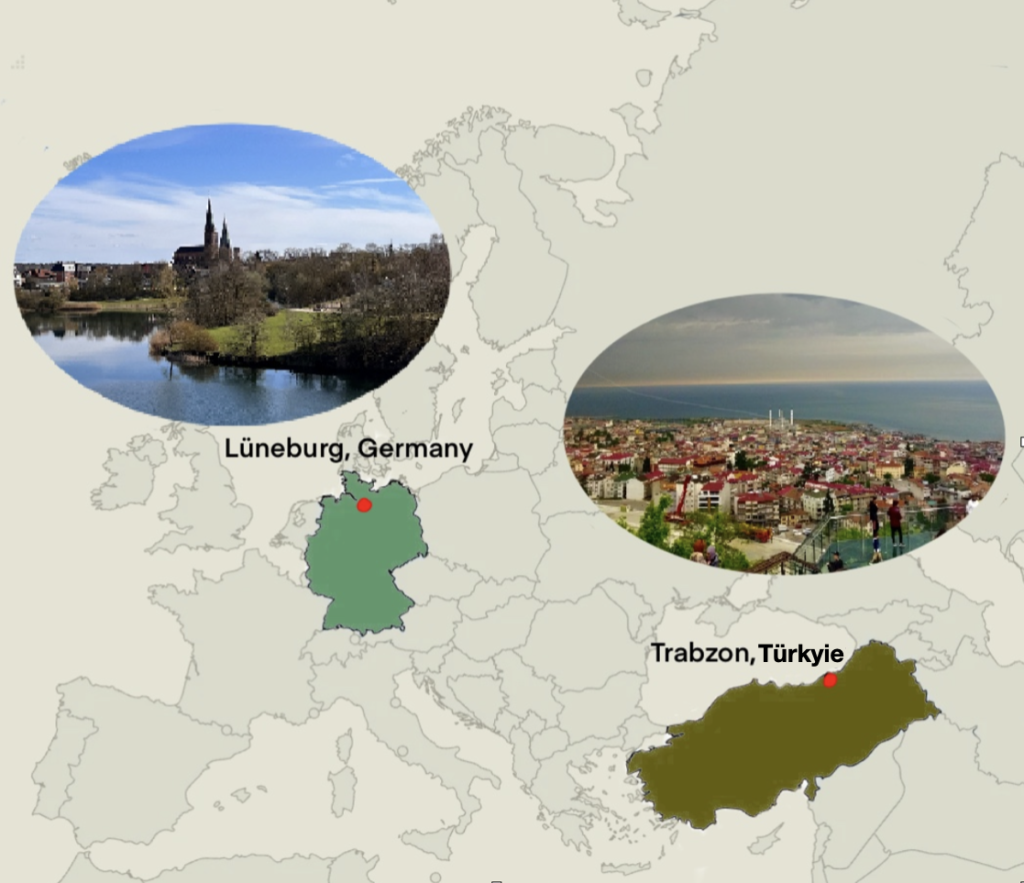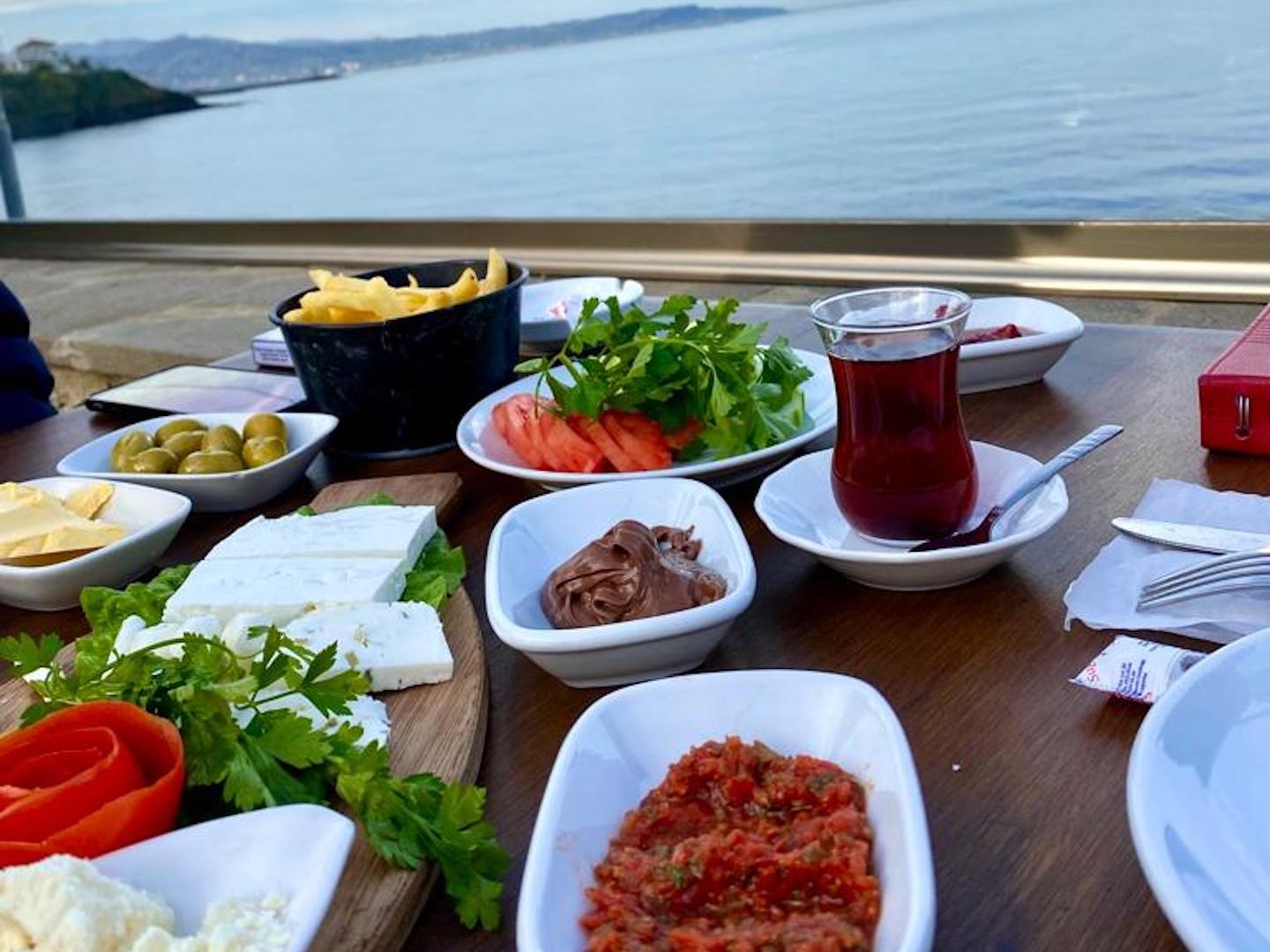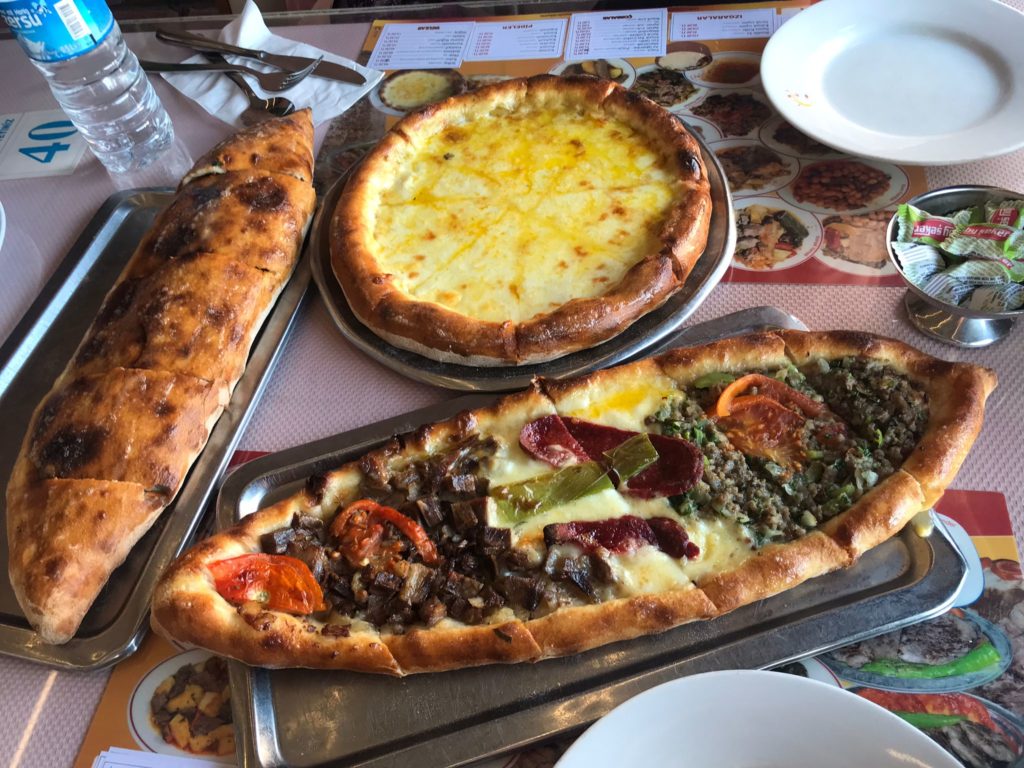Comparison of Vegetarian and Vegan Culture between Trabzon and Lüneburg
When our classmate in Leuphana told her grandma that she became a vegetarian, her grandma asked her, “But you eat chicken, right?”
There is also a funny story on this topic in one of our WG (Wohngemeinschaft, or shared apartment) in Lüneburg. There was an argument between the non-vegetarian and vegetarian flatmates. One of the non-vegetarians mentioned that even vegetables are living beings. If people become vegetarian for not killing living beings, then they shouldn’t eat vegetables. That is why there is a joke in the WG asking, “But is chicken vegetarian?”
In the following blog post we will lead you through the vegan and vegetarian world of both cities, countries and cultures. As we see culture as a driving factor for sustainability, enjoy our blog and dive into the comparison of Lüneburg and Trabzon.

Lüneburg and Trabzon
Lüneburg is a picturesque city in northern Germany, where sustainable habits are highly promoted. One of them is a vegetarian or vegan diet. Plant-based food is everywhere, such as at the university cafeteria, supermarkets, restaurants, and even in our own homes. For example, the Mensa (the German word for cafeteria) at Leuphana always offers at least one vegan option and most of the time two vegetarian options to choose from. There are different vegan choices, such as vegan chicken in supermarkets. Most of the restaurants provide more than one vegetarian choice. Within one WG, vegetarian/vegan flatmates might be in the majority.
Besides dietary efforts, Leuphana enhances Lüneburg’s sustainability image with the „Klimaneutraler Campus“ project, showcasing regional sustainability through climate neutrality, renewable tech, and 2,500 tons of annual CO2 savings, while addressing commuting emissions to underline Lüneburg’s commitment.

Moving over to Trabzon, which is a city on the Black Sea coast of northeastern Türkiye— the bustling heartbeat of the Middle East and a cultural crossroads between Europe and Asia. Türkiye, known for its culinary heritage and savory meals, has long been praised for its juicy kebabs, thick stews, and savory meat-centric delights. However, in recent years, an increasing number of Turks have adopted the ideas of vegetarianism, triggering a gastronomic revolution that has redefined the bounds of Turkish cuisine. In Trabzon, some restaurants have started offering vegetarian/vegan food. Some supermarkets have specific foods with packaging stating that they are vegetarian or vegan. However, from what the students at Trabzon University observed, there are not any vegan products in the canteen.


Two stories from Lüneburg
Lina said, “I don’t think we need vegan products, but the only vegan product I need is vegan yogurt.”
Lina, a teacher about 30 years old in Lüneburg, has been a vegetarian for 11 years. At first, she decided not to eat meat step by step.
She thinks it is easy to be a vegetarian in Lüneburg, and within her friend circle, most people follow a plant-based diet. However, among her family members, only she and her sister don’t eat meat, while the others do. When she started to be a vegetarian, she got some negative comments from her family, especially the older ones, as they usually think the young become vegetarian because they want to be “special”. However, she doesn’t agree with that. Apart from the peer influence, she is concerned about health issues and animal rights when following meat-based diets, because she read some research about antibiotic overuse, as well as the crowded and dirty living environment in animal husbandry. Even though she can’t say that she is healthier than before after becoming vegetarian, she thinks her body can’t bear meat anymore. When she eats meat, she doesn’t feel well.


Eva said, “You will be more creative when you create vegetarian recipes.”
Eva, a 23-year-old girl from Spain, is now living in Lüneburg. She has nearly four years of experience living as a vegetarian. She made her decision to be a vegetarian all of a sudden, as she felt guilty and sick when eating meat at that time.
Being a vegetarian changes her taste, and she eats more vegetables, which makes her healthier. However, at first it was hard, and she received negative feedback from her family in Spain, because she can’t eat most of the food made by her family anymore. Luckily, she is now living in Germany, and it is easier to find vegetarian or vegan food in Germany. But she still considers that even though the options are wider in German, they might not have better quality.
She also mentioned that she usually prepares different interesting vegetarian food with her flatmates in her WG.


Two stories from Trabzon:
Melisa said, “My body, my decisions. Everyone should be respectful for my eating habits.”
Melisa, a 19-year-old Muslim girl living in Trabzon, made the decision to become a vegetarian three years ago. Melisa was raised in a traditional Muslim household where meat dishes were a vital part of every meal. So, her choice raised eyebrows and piqued the interest of her family and friends. She stated that as she went more into her newfound lifestyle, she started to see the profound link between her faith and her decision to avoid eating animal products. Melisa stated that she found the notion of compassion in her 4 years of vegetarian lifestyle. She also highlighted that her puzzling experience became clearer with each passing day as she watched the enormous influence her food choices had on her physical, emotional, and spiritual well-being.


Another Trabzon student whose major is environmental engineering said, „even though eating dead animals gives negative energy, I finally gave up from being a vegetarian.“
Even if she gives us a lot of reasons why she is vegetarian, her giving up story shows us the difficulties of being vegetarian. At first, she talks about the problems of finding vegetarian options in restaurants. She states that she feels she eats unhealthily in order to choose vegetarian alternatives. On the other hand, she states that her family supported her. However, her friends being vegetarian was the biggest encouragement for her to become and maintain vegetarianism. She states that splitting up with her friends was the second reason for her to stop being vegetarian. Even though she is a mindful vegetarian who also thinks from the aspect of environmental effects, her social environment caused her to abandon vegetarianism.

How did the transition from meat-consuming culture to vegetarian culture happen in Lüneburg and Germany?
Germany is experiencing a notable cultural shift, transitioning from a society with a strong emphasis on meat consumption to one that increasingly embraces vegetarianism. Lüneburg, in line with this evolving ethos, proudly proclaims itself a sustainable city in its sustainability report. This shift towards vegetarianism is primarily motivated by concerns spanning health, ethics, and environmental sustainability.
The dedication of Lüneburg’s residents played a pivotal role in the city earning the prestigious title of a fairtrade-town in 2012. This achievement aligns with the city’s mission to promote awareness of sustainable and fair consumption practices. Following its initial recognition, Lüneburg successfully maintained the title until 2018, and efforts to retain this status continue.
Additionally, Lüneburg has been participating in Earth Hour since 2013, supporting WWF’s climate initiative by turning off street lights and building exterior lighting around the market square, town hall, and Heinrich Heine House for one hour.
Lüneburgs commitment to sustainability also becomes clear through the availability of vegetarian and vegan choices. The city has witnessed a proliferation of plant-based offerings across various settings, including university cafeterias, supermarkets, and restaurants. Leuphana University’s cafeteria, for instance, consistently caters to the diverse dietary preferences of its students by providing vegan and vegetarian options. Additionally, the presence of organic food stores, referred to as Biomarkt, contributes to a lifestyle that prioritizes sustainability and health-consciousness.
Additionally, the shifting trend towards a vegetarian culture is evident in the living arrangements of Lüneburg, such as shared apartments known as WGs. Vegetarian and vegan flatmates have become the majority in many instances, creating a supportive environment conducive to culinary experimentation and the cultivation of creativity in meal preparation.
Overall, the transition from a culture centered around meat consumption to one embracing vegetarianism in Lüneburg is characterized by personal journeys, involving dietary preferences, and an expanding range of plant-based choices. The city’s residents are increasingly mindful of the implications for health, ethics, and the environment, driving them towards more sustainable and compassionate dietary decisions.
How about Türkiye?
Türkiye is a country that has a rich cuisine. However, for veganism and vegetarianism, Türkiye is following a slow path in taking the necessary steps for these two dietary choices. There are various reasons for this.
Firstly, we can see their cultural background as a reason. Türkiye is a Muslim country, which has some traditions such as a holiday named Eid Qurban. In this holiday, some people choose to sacrifice an animal, usually a cow or a sheep. People performing sacrifices share the meat with their family and their neighbors.
In addition, the options are scarce, making it more difficult to find vegan and vegetarian products. When we look at it on a large scale, of course, we come across vegan and vegetarian products. These products are more common in big cities than in small cities. As we mentioned in the second story in Trabzon, even though she experienced the benefits of the vegetarian diet, the student eventually gave up her vegetarian diet.
Even though the transition from a meat-consuming culture to a vegetarian culture is not so significant, Turkish vegetarianism is more than a passing trend; it is a movement that spans the country’s gastronomic past, present, and future.
Vegetarians in Türkiye are redefining attitudes and proving that meatless meals can be both fulfilling and firmly based in tradition, while honoring the country’s cultural history of robust, savory food. They are leading the way for a greener, more compassionate future by adopting ethical and health-conscious choices, where the rich tapestry of Turkish tastes harmonizes with a thoughtful attitude to eating. Take Istanbul, for example; with its abundance of restaurants, cafés, and street food sellers catering to the rising demand for meatless choices. These restaurants expertly combine traditional Turkish ingredients and techniques with novel plant-based twists, yielding enticing meals that appeal to both vegans and omnivores.
As people in Türkiye are becoming more conscious and as they become more conscious of sustainability issues and become familiar with a broader range of food choices, many of them are open to trying new lifestyles. Therefore, vegetarian and vegan diet choices are increasing day by day.
Conclusion
The transition from a meat-consuming culture to a vegetarian culture is taking place in both Lüneburg and Trabzon, albeit at different rates and levels of acceptance. In Lüneburg, the shift towards vegetarianism is unmistakable, driven by concerns for health, ethics, and the environment. Local residents like Lina and Eva have wholeheartedly embraced vegetarianism, overcoming initial hurdles and skepticism from their families. The availability of vegetarian and vegan options in university cafeterias, supermarkets, and restaurants has played a pivotal role in facilitating this transition. Moreover, the prevalence of vegetarian and vegan flatmates in shared apartments creates a supportive atmosphere that encourages culinary exploration and innovation.
Conversely, Türkiye, renowned for its meat-centric cuisine, is gradually embracing vegetarianism. While there are challenges to overcome, such as the limited availability of vegan and vegetarian products and cultural traditions deeply rooted in meat consumption, there is a growing awareness of the significance of these dietary choices. Melisa’s personal journey exemplifies the transformative power of vegetarianism, while the experience of the other student who reverted from being vegetarian sheds light on the difficulties caused by social pressures and the lack of options.
All in all, the transition to a vegetarian culture in both Lüneburg and Trabzon is shaped by individual experiences, evolving dietary preferences, and the accessibility of plant-based alternatives. Lüneburg stands out for its more pronounced shift, while Türkiye is gradually developing a deeper understanding of veganism and vegetarianism. Exploring these dietary choices and raising awareness through projects like the one undertaken by the students can contribute to the further expansion of vegetarianism and veganism in the future.
And perhaps, in the world of vegan choices, the answer to the chicken joke at the beginning is still „vegan chicken!”.
Reference List
Hansestadt Lüneburg (2021): Nachhaltigkeitsbericht 2021. Hansestadt Lüneburg, Am Ochsenmarkt 21315 Lüneburg.Nachhaltigkeitsbericht 2021 – Hansestadt Lüneburg
Top 3 Deutscher Nachhaltigkeitspreis Forschung (2016): Klimaneutraler Campus Leuphana Universität Lüneburg: Das 0 Emissionen Quartier.
Klimaneutraler Campus Leuphana Universität Lüneburg: Das 0 Emissionen Quartier

